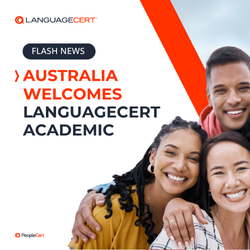The annual NEAS conference kicked off today at the University of Technology in Sydney. Given all that has gone on in the sector in the last 18 months, there was a strong turnout, with over 120 in attendance.
Aadam Kilburn, CEO of NEAS, started the conference by introducing Yvonne Weldon, an independent councillor for the City of Sydney, who provided the welcome to country.
David Yoo, Deputy Chair of the Board, officially opened the conference, followed by remarks from the Principal Sponsor, Stephanie Bethencourt, representing IELTS.
Next up was the plenary speaker, Medhi Sina. Medhi was born in Afghanistan during civil war, grew up in Pakistan and lived without a nationality for a long time. His story, detailing the journey to Australia and today, including making rugs at a young age, his father’s passing, people smugglers and boat journeys, was truly inspirational. It is a reminder to all the difficult situations faced by many around the globe in the present times.
Cathy Jones, Assessment Development Specialist at LanguageCert, delivered an incisive presentation on the growing impact of generative AI on student learning and assessment. She argued that as AI tools increasingly support – and sometimes undermine – students’ written work, educators must rethink how they assess language proficiency. Highlighting that critical thinking is often developed through the act of writing, Jones warned of the educational cost of AI-assisted shortcuts and made a compelling argument supporting the resurgence of the oral viva exam in higher education. Her session showcased how oracy assessment, including techniques like role-play and improvisation, can offer a more authentic and reliable measure of students’ communicative and critical thinking skills in an AI-driven academic landscape.
Lunch.
Jarrad Merlo wowed the crowd post-lunch, talking AI, Agentic AI (or AI agents) to be precise. His live example of J.A.R.V.I.S made the crowd laugh at the expense of some of the attendees. As Jarrad pointed out, there is a serious side to this. He then walked through an example of producing an audio file [insert any information output]. In real time, he walked through a lecture on Psychology, a topic determined by a crowd participant. The result? Jarrad’s voice is being used, almost identical, with a lecture being produced for the cost of approximately 11c versus $300 (approx.) for a human to do it. Here is the threats and opportunities dilemma, as he refers to it.
The tone of the conference shifted and moved back to the student at the centre of what we do. A student panel facilitated by Adam Kilburn and participated in by Ogunbodede Olaitan, MD, and William Nguyen. Hearing from these two gentlemen about their stories, reflections and emotions about studying in Australia was fantastic.
The final session was a compliance panel. Carmen Basilicata (ASQA), Jen Bahen (TEQSA), and Melinda Hatton (TPS) were joined by sector members on stage to discuss the current principles that inform compliance and how the various agencies interpret these.
The Koala thanks NEAS for the invitation to attend and congratulates Adam Kilburn and Sylvia Loss for a great day!


















